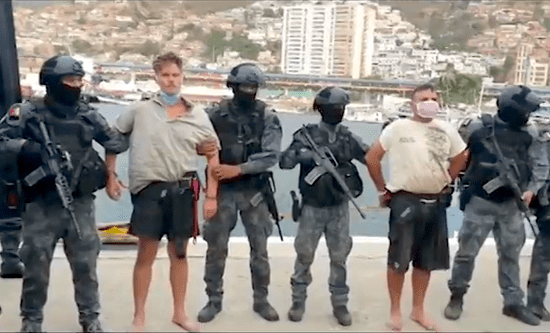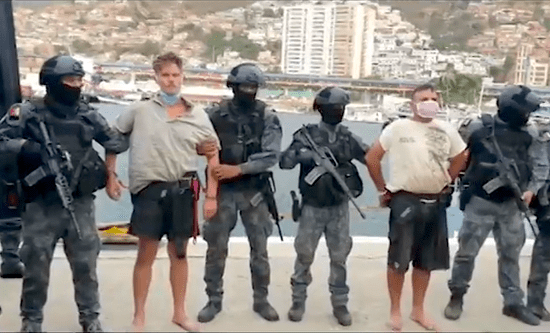
Like a scene out of Rambo, mercenaries on speedboats led by US special ops veterans raced towards Venezuela’s coast in two waves on 3-4 May. This was ‘Operation Gideon’, its aim: to capture high-ranking government officials, including President Nicolas Maduro, turn them over to the United States and overthrow Venezuela’s Bolivarian revolution. The new coup-government was to be led by Juan Guaido, the opposition leader and self-styled president touted by the US and its allies as the face of ‘regime change’ since he swaggered onto the scene in 2019. Hollywood fantasy quickly evaporated, however, as these charlatans found themselves tied up, detained and defeated by an organised revolutionary Venezuelan people, determined to defend their sovereignty. SAM McGILL reports.
The coup that failed
The Bolivarian armed forces intercepted the first wave at the country’s main port of La Guaira, where a shoot-out left eight paramilitaries dead. Then, tipped off by the Venezuelan intelligence agency, fishing communities in the predominantly Afro-Venezuelan Chuao Valley enacted a beach defence plan, capturing the mercenaries and tying them up with fishing rope while waiting for the authorities to arrive. Their actions were replicated in other coastal villages. Since the attack, 52 mercenaries have been detained. Yet another coup attempt was defeated by the strength of the alliance between the Venezuela’s loyal armed forces and the 3.5 million-strong Bolivarian militia volunteers. As community activist Ana Felicien explained: ‘the militias are everywhere, the militias are the people, they are not separate … they defend us through every day actions and also in critical times, defending the border’.
The plot was coordinated by a US Army special operations veteran, Jordan Goudreau, and his Florida-based private security firm Silvercorp USA. Silvercorp provided security at Donald Trump’s election rallies and for Richard Branson’s farcical ‘Venezuela Aid’ concert in Colombia last year, which attempted to provide cover for USAID intervention across the border. A former Venezuelan major general, Cliver Alcala, trained 300 Venezuelan military, paramilitary and police defectors in camps in the Colombian city of Riohacha – a headland away from Venezuelan waters. Finance and logistics were provided by the Colombian La Guajira drug cartel. The operation had already been compromised after a cache of weapons was seized in Colombia in March. Alcala took that hit, releasing a confession tape before handing himself over to the authorities. Then, on 1 May, the Silvercorp plot was exposed by the Associated Press news agency. Nevertheless a band of 60 mercenaries pressed ahead.
Guaido initially denied any involvement before an incriminating Silvercorp contract for $212m, signed by him and his top aides, was made public. The contract reveals that Goudreau was promised a bonus of $10m and a lucrative contract under Guaido in Venezuela if his plot succeeded. An investors’ group was fronting the $212m bill, to be paid back by Guaido’s government at 55% interest, payable in barrels of oil. Guaido committed $450,000 to the families of any Silvercorp personnel who were arrested, wounded or killed in the course of the operation, and operatives were absolved of responsibility for any destruction or loss of life in the process of carrying out the mission. The contract gives the green light to the use of deadly anti-personnel mines – whose use is banned by 150 countries (not including the United States) – military strikes against infrastructure and other economic targets, and the use of deadly force against civilians.
US and Britain manoeuvre against Venezuela
The US has denied ‘direct’ involvement in this botched invasion. Yet just days before the attack, a string of tweets from US Secretary of State Mike Pompeo, Special Representative for Venezuela Elliot Abrams and former National Security Adviser John Bolton gloated that: ‘Transition in Venezuela is coming’, ‘Morning is coming to Venezuela again’ and that the proxy US embassy for Venezuela in Colombia would ‘soon be moving to Caracas’. Two former members of the US Army Special Forces – Luke Denman and Aidan Berry – were captured as the plot was foiled. Their families told US news channels that the two men had believed the operation had US backing. Certainly it is the US Treasury Department which bankrolls Guaido’s phoney ‘administration’, using $11.6bn of frozen Venezuelan state assets. In March, the US Justice Department indicted Nicolas Maduro on trumped-up ‘narco-terrorism’ charges, placing a bounty of $15m on his head. In April, Trump issued an executive order activating armed forces reservists for a supposed ‘anti-narcotics’ mission against Venezuela.
The British government is also up to its neck in dirty manoeuvres aimed at destabilising Venezuela’s socialist government. The British left-wing news website The Canary discovered through a series of Freedom of Information requests that a secret ‘reconstruction of Venezuela’ unit exists within the UK Foreign Office (The Canary, 13 May 2020). It is headed by John Saville, Britain’s ambassador to Venezuela from 2014 to 2017, who promoted British recognition of Juan Guaido as ‘interim president’ in January 2019, and urged the Bank of England to hand over to Guaido the £1.2bn of Venezuelan gold reserves frozen since then. The gold is currently subject to a lawsuit filed against the Bank by the Venezuelan government, which wants £930m worth of the reserves sold and the money channelled through the United Nations to fund Covid-19 relief within Venezuela. Saville also directed the the Department for International Development to channel at least £40m of ‘humanitarian assistance’ to Venezuela without revealing who the beneficiaries of the funding would be. The Foreign Office has previously admitted to financing three opposition outfits committed to overthrowing the government, including the rather misleadingly named Radiophonic Institute of Faith and Joy.
This ‘reconstruction unit’ was central to talks between Guaido and British Foreign Secretary Dominic Raab and the Minister for the Americas, Christopher Pincher in January 2020 when Venezuela’s wannabe president visited London. The Canary reveals that the Foreign Office ensured positive press coverage of Guaido’s visit, while the Guaido-appointed fake ‘envoy’ to Britain, Vanessa Neumann, emphasised her desire to ‘sustain British business in Venezuela’s reconstruction’. Neumann’s Asymmetrica Ltd firm is co-directed by Alec Bierbauer and Michael Marks, who work closely with the US military and are credited with developing US drone warfare. It is no coincidence that in 2018, President Maduro was the target of a failed drone assassination attempt. The exposé has led to Venezuela’s diplomatic denunciation of British support for coup-mongering in Caracas. As Samuel Moncada, Venezuela’s ambassador to the UN put it, ‘The British government is looking for business advantages once Trump imposes his colonial regime in Venezuela’.
Meanwhile, the mainstream British media continues with propaganda against Venezuela’s Bolivarian Revolution. The Guardian’s current Latin America correspondent, Tom Phillips, penned his usual hatchet job after the failed coup attempt, taking the side of the captured US Green Beret Luke Denman, whom he described as simply wanting to help ‘Venezuelans take back control of their country’, and calling into question the authenticity of Denman’s video confession. As per usual, Phillips makes reference to Venezuela’s ‘food shortages, violence and political turmoil’ whilst completely failing to mention the devastating impact of US sanctions. Three other Guardian hacks – Julian Borger, Joe Parkin Daniels and Chris McGreal – conclude their piece on Operation Gideon by publishing Guaido’s ludicrous accusation against Maduro of having ‘blood on his hands’ for letting the operation go ahead. Once again The Guardian shows that despite its liberal veneer, it cannot offer a truthful picture of what is underway in Venezuela. Doing so would require it to side with the Bolivarian revolutionary struggle against 20 years of US imperialist sabotage and destabilisation.
Not one of the 50, predominantly western, countries that ‘recognise’ Guaido as the interim president of Venezuela have uttered one word of condemnation of the coup attempt against a sovereign country. Guaido has been at the centre of a string of scandals and failures since he swore himself in as president in 2019. He has never stood as a presidential candidate, and now cannot even claim to be head of the opposition-dominated National Assembly. He has been pictured with Colombian drug traffickers Los Rastrojos after they helped him cross into Colombia, his team have been caught red handed blowing the cash given to them for ‘humanitarian aid’ on prostitutes, hotels and flash cars and now his team is paying itself $5,000 a month from money destined for ‘humanitarian assistance’. Such ‘assistance’ never demands the lifting of sanctions that have cost Venezuela $120bn since 2014 and which UN human rights expert Alfred de Zayas estimates are responsible for up to 100,000 deaths.
Defying the US blockade
On 25 March, the first of five Iranian tankers bringing 1.5 million barrels of gasoline docked at Puerto Cabello, the site of Venezuela’s biggest oil refinery, in defiance of US sanctions on both countries. Oil workers celebrated on the dock, waving Iranian and Venezuelan flags, after the oil tanker Fortune dropped anchor. The US had deployed naval ships to the area, saying it was watching the situation closely and was ‘considering measures’. Iran made it clear that any hostile action would be met with a ‘quick and decisive response’, and it was clear, with Venezuelan navy and air support accompanying the convoy of tankers into its national waters, that for the United States the risk of direct intervention was too great. Iran has also provided key components to get Venezuela’s refineries working productively again. The Iranian fuel is urgently needed as the US has imposed secondary sanctions on Russia’s Rosneft, which had been carrying 60% of Venezuela’s exports, as well as ending sanctions waivers for Chevron and putting pressure against Indian trade. Venezuela’s heavy crude oil needs complex refining, and the nation desperately needs fuel and diluent for oil refineries, industry and power generation. Rolling blackouts and rationing leave whole states without electricity for days at a time whilst oil output has been slashed to around 700,000 barrels per day, down from 2 million in 2018.
Covid-19 – Venezuela’s exemplary response
Despite the apocalyptic prediction of death in Venezuela ‘on an appalling scale’ as a result of Covid-19 from the politically-motivated David Miliband of the International Rescue Committee – and much to the chagrin of Tom Phillips – Venezuela has so far been able to control the impact of the coronavirus. Although its economy, health system and food provision have been ravaged by sanctions and economic sabotage, as of 27 May Venezuela had 1,245 confirmed cases of infection, and just 11 deaths. It may struggle to sustain this as tens of thousands of Venezuelan migrants pour over the borders from Colombia and Brazil, where Covid-19 is wreaking devastation. However the measures it has taken to date offer an object lesson on how to contain the pandemic. These include:
- Free health care for all.
- Mass testing – Venezuela has carried out more tests per capita than any other country in Latin America.
- Being the first country in Latin America to introduce a national quarantine on 17 March, after restricting international air travel five days earlier.
- Mandatory wearing of medical masks and gloves in public.
- Deployment of workers in major cities to disinfect public areas.
- Medical teams, including Cuban doctors, going door-to-door to survey, test and if necessary quarantine those reporting symptoms.
However the economic impacts of lockdown are hitting hard. Wage increases are quickly eroded by inflation; the Bolivar has lost 57% of its value against the dollar since March. Food boxes delivered to six million families are a lifeline but the inability to supplement incomes via the informal sector, scarcity of food and shortages of cooking gas, electricity and water are ramping up the pressure in the barrios. Unsurprisingly there have been isolated instances of looting, whilst the comunas and social movements demand decisive action to confront capitalist speculation and sabotage. The survival of the Bolivarian revolutionary movement continues to depend on the organised working class and poor, fighting to construct socialism against all odds.
Fight Racism! Fight Imperialism! No 276, June/July 2020




